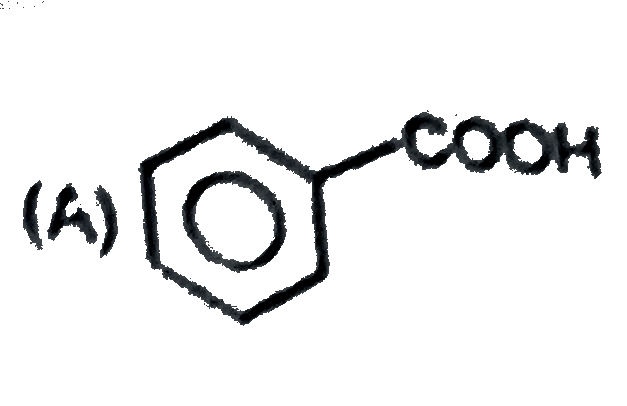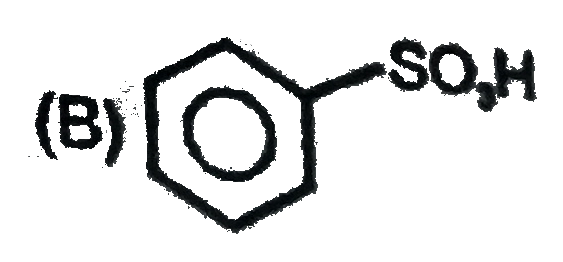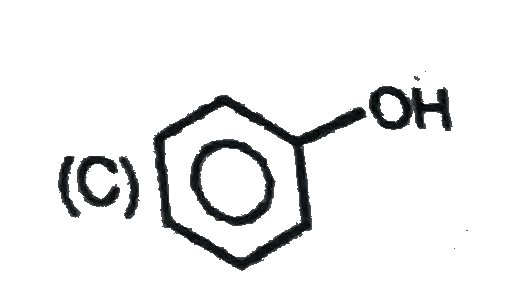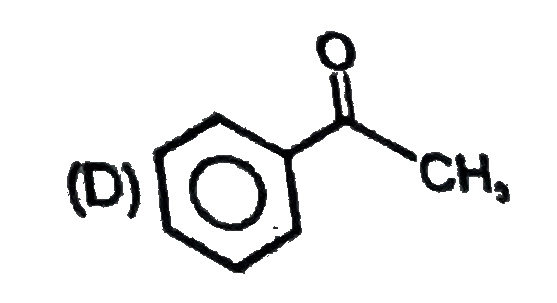In which of the following compound exchange can be observed on keeping it in




The correct Answer is:D
To solve the problem of which compound can undergo O^18 exchange when kept in H2O^18, we will analyze each of the given compounds and their potential for isotopic exchange with the labeled water.
1. Understanding Isotopic Exchange:
- Isotopic exchange involves the replacement of one isotope of an element with another isotope of the same element. In this case, we are looking for the exchange of O^16 with O^18.
2. Identifying the Compounds:
- We have four compounds to analyze:
- A: Carboxylic Acid
- B: Benzene Sulfonic Acid
- C: Phenol
- D: Ketone
3. Analyzing Each Compound:
- Carboxylic Acid:
- Carboxylic acids can participate in exchange reactions, but they typically do not form stable intermediates with water that would lead to O^18 exchange.
- Benzene Sulfonic Acid:
- Similar to carboxylic acids, benzene sulfonic acids do not readily undergo isotopic exchange with water due to the stability of the sulfonate group.
- Phenol:
- Phenol can undergo some degree of exchange, but it does not form a stable intermediate that would facilitate O^18 exchange with water.
- Ketone:
- Ketones can form hydrates in the presence of water. The reaction can be represented as:
R2C=O+H2O→R2C(OH)2
- In this reaction, the oxygen from H2O^18 can replace the oxygen in the carbonyl group of the ketone, leading to O^18 exchange.
4. Conclusion:
- Among the compounds analyzed, the ketone is the only one that can undergo O^18 exchange when kept in H2O^18 due to the formation of a hydrate.
Final Answer:
The compound that can undergo O^18 exchange when kept in H2O^18 is Option D: Ketone.
- Isotopic exchange involves the replacement of one isotope of an element with another isotope of the same element. In this case, we are looking for the exchange of O^16 with O^18.
- We have four compounds to analyze:
- A: Carboxylic Acid
- B: Benzene Sulfonic Acid
- C: Phenol
- D: Ketone
- Carboxylic Acid:
- Carboxylic acids can participate in exchange reactions, but they typically do not form stable intermediates with water that would lead to O^18 exchange.
- Benzene Sulfonic Acid:
- Similar to carboxylic acids, benzene sulfonic acids do not readily undergo isotopic exchange with water due to the stability of the sulfonate group.
- Phenol can undergo some degree of exchange, but it does not form a stable intermediate that would facilitate O^18 exchange with water.
- Ketones can form hydrates in the presence of water. The reaction can be represented as:
R2C=O+H2O→R2C(OH)2
- In this reaction, the oxygen from H2O^18 can replace the oxygen in the carbonyl group of the ketone, leading to O^18 exchange.
- Among the compounds analyzed, the ketone is the only one that can undergo O^18 exchange when kept in H2O^18 due to the formation of a hydrate.
The compound that can undergo O^18 exchange when kept in H2O^18 is Option D: Ketone.
Topper's Solved these Questions
Similar Questions
Knowledge Check
Which of the following compounds are more acidic than H2O?
ACH3−OHBH−O∣∣C−OHCCH3−..NH2D
Which of the following compound does not undergo base - catalyzed exchange in D2O even though it has an α-hydrogen?
A B
B C
C Dboth (b) & (c)
Dboth (b) & (c)Which of the following will not react with H2O?
ACHCl3BCl3C−CHOCCCl4D
Which of the following sulphate is insoluble in H2O
View SolutionWhich of the following set of compounds have peroxide bonds ?
1. O2F2 2. H2O2 3. H2S2O8 4. CrO5
View SolutionWhich of the following can be the isomer(s) of C8H8O:
View SolutionWhich of the following compounds decolourise Br2−H2O and also give positive test with neutral FeCl3 :
View SolutionWhich of the following ethers will get hydrolysed by H⊕/H2O?
View Solution
